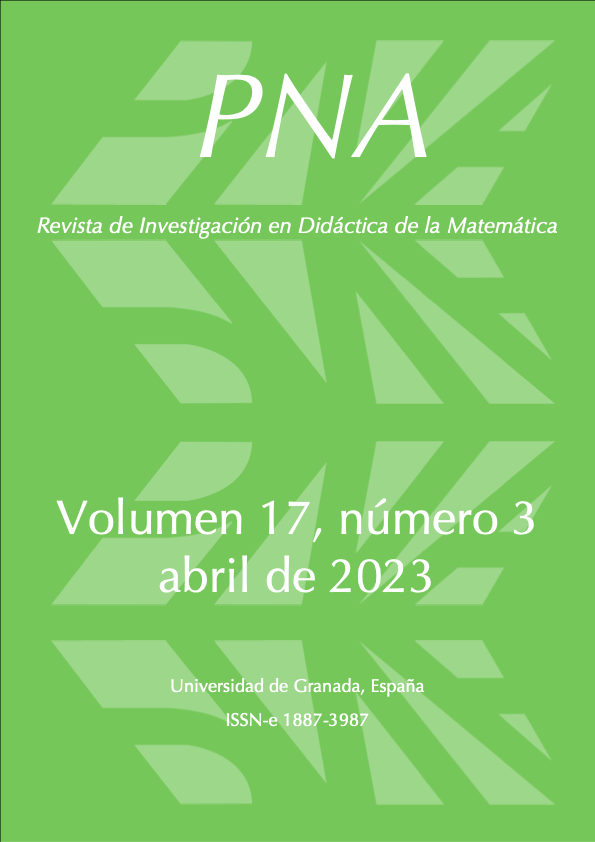Modelización estadística para el aprendizaje de la correlación y regresión lineal
DOI:
https://doi.org/10.30827/pna.v17i3.23937Palabras clave:
Modelación Estadística, Estadística Educativa, Correlación Lineal, Regresión Lineal, Actividades Generadoras de ModelosResumen
Este trabajo muestra los resultados del uso de Actividades Generadoras de Modelos para el aprendizaje de la correlación y regresión lineal. Los participantes adquirieron, ampliaron y refinaron sus conocimientos y habilidades estadísticas, organizando, analizando y representando datos, estableciendo correlaciones y determinando líneas de regresión y coeficientes de determinación; además, con los modelos planteados, realizaron conclusiones, explicaciones, descripciones y predicciones del comportamiento del modelo. Se avanzó en el entendimiento de la importancia del uso de representaciones gráficas adecuadas y las bondades de la tecnología en el procesamiento de los datos estadísticos bivariados.
Descargas
Citas
Abassian, A., Safi, F., Bush, S. y Bostic, J. (2020). Five different perspectives on mathematical modeling in mathematics education. Investigations in Mathematics Learning, 12(1), 53-65. https://doi.org/10.1080/19477503.2019.1595360 DOI: https://doi.org/10.1080/19477503.2019.1595360
Artigue, M., Douady, R., Moreno, L. y Gómez, P. (1995). Ingeniería didáctica en educación matemática: un esquema para la investigación y la innovación en la enseñanza y el aprendizaje de las matemáticas. Grupo Editorial Iberoamérica.
Aridor, K. y Ben-Zvi, D. (2018). Statistical modeling to promote students’ aggregate reasoning with sample and sampling. ZDM-Mathematics Education, 50(7), 1165-1181. https://doi.org/10.1007/s11858-018-0994-5 DOI: https://doi.org/10.1007/s11858-018-0994-5
Aridor, K. y Ben-Zvi, D. (2019). Students’ aggregate reasoning with covariation. En G. Burril y D. Ben-Zvi (Eds.), Topics and trends in current statistics education research. ICME-13 monographs (pp. 71-94). Springer. https://doi.org/10.1007/978-3-030-03472-6_4 DOI: https://doi.org/10.1007/978-3-030-03472-6_4
Blomhøj, M. (2009). Different perspectives in research on the teaching and learning of mathematical modelling – categorising the TSG21 papers. En M. Blomhøj y S. Carreira (Eds.), Mathematical applications and modelling in the teaching and learning of mathematics. pp. 1–17. Roskilde: Department of Science, Systems and Models, Roskilde University. https://rucforsk.ruc.dk/ws/portalfiles/portal/3820977/IMFUFA_461.pdf#page=6
Constantinou, C. P., Nicolaou, C. T. y Papaevripidou, M. (2019). A framework for modeling-based learning, teaching, and assessment. En A. Upmeier zu Belzen, D. Krüger y J. van Driel (Eds.), Towards a competence-based view on models and modeling in science education (Vol. 12, pp. 39-58). Springer. https://doi.org/10.1007/978-3-030-30255-9_3 DOI: https://doi.org/10.1007/978-3-030-30255-9_3
Doerr, H. y English, L. D. (2003). A modeling perspective on students’ mathematical reasoning about data. Journal for Research in Mathematics Education, 34(2), 110–136. https://doi.org/10.2307/30034902 DOI: https://doi.org/10.2307/30034902
Engel, J. y Sedlmeier, P. (2011). Correlation and regression in the training of teachers. En C. Batanero, G. Burril y C. Reading (Eds.) Teaching statistics in school mathematics-challenges for teaching and teacher education (Vol. 14, pp. 247-258). Springer. https://doi.org/10.1007/978-94-007-1131-0_25 DOI: https://doi.org/10.1007/978-94-007-1131-0_25
Gea, M. (2014). La correlación y regresión en bachillerato análisis de libros de texto y del conocimiento de los futuros profesores. [Tesis de doctorado, Universidad de Granada]
https://digibug.ugr.es/bitstream/handle/10481/34257/24031550.pdf?sequence=1
Gea, M., Batanero, C. y Roa, R. (2014). El sentido de la correlación y regresión. Números, 87, 25-35.
Kaiser, G., Blomhøj, M. y Sriraman, B. (2006). Towards a didactical theory for mathematical modelling. ZDM-Mathematics Education, 38(2), 82-85. https://doi.org/10.1007/BF02655882 DOI: https://doi.org/10.1007/BF02655882
Lehrer, R. y English, E. (2018). Introducing children to modeling variability. En D. Ben-Zvi, K. Makar y J. Garfield (Eds.), International handbook of research in statistics education (pp. 229–260). Springer. https://doi.org/10.1007/978-3-319-66195-7_7 DOI: https://doi.org/10.1007/978-3-319-66195-7_7
Lesh, R., Hoover, M. Hole, B., Kelly, A. y Post, T. (2000). Principles for developing thought-revealing activities for students and teachers. En A. Kelly y R. Lesh (Eds.). Handbook of research design in mathematics and science education (pp. 591-646). Routledge.
Lesh, R. y Doerr, H. (Eds.) .(2003). Beyond constructivism – Models and modeling perspectives on mathematics problem solving, learning and teaching. Routledge. https://doi.org/10.4324/9781410607713 DOI: https://doi.org/10.4324/9781410607713
Lesh, R. y Sriraman, B. (2010). Re-conceptualizing mathematics education as a design science. En B. Sriraman y L. English (Eds.), Theories of mathematics education. Advances in mathematics education (pp. 123-146). Springer. https://doi.org/10.1007/978-3-642-00742-2_14 DOI: https://doi.org/10.1007/978-3-642-00742-2_14
López, J. L., Pontes, A. y Varo, M. (2019). Las TIC en la enseñanza científico-técnica hispanoamericana: una revisión bibliográfica. Digital Education Review, 1(35), 229-243. https://doi.org/10.1344/der.2019.35.229-243 DOI: https://doi.org/10.1344/der.2019.35.229-243
Moliní, F. y Sánchez, D. (2019). Fomentar la participación en clase de los estudiantes universitarios y evaluarla. REDU: revista de docencia universitaria, 17(1), 211-227. https://doi.org/10.4995/redu.2019.10702 DOI: https://doi.org/10.4995/redu.2019.10702
Patel, A. y Pfannkuch, M. (2018). Developing a statistical modeling framework to characterize Year 7 students’ reasoning. ZDM-Mathematics Education, 50(7), 1197-1212. https://doi.org/10.1007/s11858-018-0960-2 DOI: https://doi.org/10.1007/s11858-018-0960-2
Pfannkuch, M., Ben-Zvi, D. y Budgett, S. (2018). Innovations in statistical modeling to connect data, chance and context. ZDM-Mathematics Education, 50(7), 1113-1123. https://doi.org/10.1007/s11858-018-0989-2 DOI: https://doi.org/10.1007/s11858-018-0989-2
Seber, G. A. y Lee, A. J. (2003). Linear regression análisis. John Wiley y Sons. https://doi.org/10.1002/9780471722199 DOI: https://doi.org/10.1002/9780471722199
Upmeier zu Belzen, A., van Driel, J. V. y Krüger, D. (2019). Introducing a framework for modeling competence. En A. DOI: https://doi.org/10.1007/978-3-030-30255-9_1
Upmeier zu Belzen, D. Krüger y J. van Driel (Eds.) Towards a competence-based view on models and modeling in science education (pp. 3-19). Springer.
Wild, C. J. y Pfannkuch, M. (1999). Statistical Thinking in Empirical Enquiry. International Statistical Review, 67(3), 223-248. https://doi.org/10.1111/j.1751-5823.1999.tb00442.x DOI: https://doi.org/10.1111/j.1751-5823.1999.tb00442.x
Zieffler, A., Garfield, J. y Fry, E. (2018). What Is Statistics Education?. En D. Ben-Zvi, D. Makar y J. Garfield (Eds.), International handbook of research in statistics education (pp. 37–70). Springer. https://doi.org/10.1007/978-3-319-66195-7_2 DOI: https://doi.org/10.1007/978-3-319-66195-7_2



















